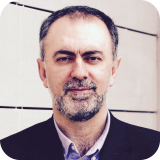MATEU SERVERA
MATEU SERVERA

Sluggish Cognitive Tempo (SCT) is a psychological dimension originally linked to the inattentive subtype of Attention Deficit Hyperactivity Disorder (ADHD). In fact it was proposed and continues having weight in the attempt to define a pure inattentive subtype without symptoms of hyperactivity. However, in the last decade it has been established itself as an independent dimension, so that although its measure continues being significantly related to the behaviors in the inattention of ADHD, it has shown to have a relevant influence in many areas of behavioral, social, academic, and emotional activity of the child. So far much of the research has focused on the definition of the SCT dimension; and at this point we already have enough evidence of the applied profile of the child with this trait. In this symposium we will present some research in this line. Firstly, Dr. Camprodon-Rosanas will analyze the association between working memory and attentional networks, and SCT symptoms. Next, Cristina Trias will present data to reflect the profile of children with ADHD and high scores on SCT in the WISC-IV scales and CSAT attentional task. Right after, Belén Sáez will present the data of the Spanish adaptation of one of the few self-report measures to evaluate the SCT in children. Finally, Dr. Mateu Servera, based on the main factorial domains of the SCT, will analyze their comparative clinical influence on ADHD. This symposium will help the attendees to learn about clinical, neuropsychological and behavioral characteristics of the SCT child and the child with ADHD and high scores in SCT.
Mateu Servera is Doctor in Psychology and Psychologist Specialist in Clinical Psychology. He is a Professor at the University of the Balearic Islands since 1993, and researcher at the Research Institute in Health Sciences (IUNICS) since 2002. His main research focuses on Attention Deficit Hyperactivity Disorder (ADHD) and Sluggish Cognitive Tempo. He has been principal investigator or researcher in 12 competitive research projects, 4 research contracts and has authored or coauthored more than 30 articles in scientific journals, more than 25 participations in books, book chapters, monographs and scientific papers, and over 70 participations in conferences or scientific meetings.




